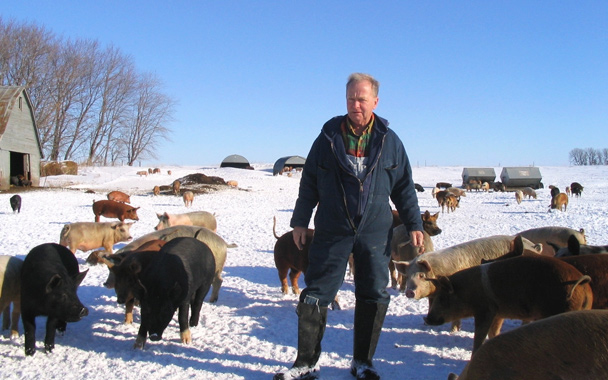January is turning out to be the cruelest month. In the past week, the economic crisis dealt back-to-back blows to the sustainable food industry.
The venerable but financially beleaguered Niman Ranch, famous for selling high-quality natural meats since being founded in the early1970s by Bill Niman (who left the firm in 2007), was forced this week to merge with Natural Foods Holdings, a division of the Chicago-based equity company that is Niman’s largest investor. According to the San Francisco Business Times, Niman CEO Jeff Swain said in a letter to shareholders that the Bay Area company was in default on loans, owed key vendors money, and was facing a decline in sales.
Swain told shareholders that Niman had been unable to secure additional credit and that without merging it did not have the funds to continue operations past the end of this month.
“We recently entered into a merger agreement with an entity that will provide our Company with a significantly stronger balance sheet and the liquidity to grow and expand our business. The transaction has been approved by our shareholders and is expected to close in the next few days with no expected disruption in our service to customers,” he said in a statement.
According to Swain, it was the best outcome for the more than 600 family farmers who depend on Niman Ranch; the brand—and more importantly the philosophy—will now have access to the capital it requires.
Last week, Australis Aquaculture, Ltd. announced that it had entered voluntary administration, a procedure designed to give executives time to try to renegotiate terms with their creditors. The company had “not been successful in raising sufficient finds to meet its objectives,” which included paying off a loan due at the end of this month, according to Sustainable Food News.
What it had been able to do very well was raise a good-tasting, white-fleshed fish in a way that did minimal harm to the environment. Australis Aquaculture achieved seafood’s trifecta of sustainability in December by earning a “Best Choice” ranking in the Blue Ocean Institute’s Guide to Ocean Friendly Seafood. It had already gained the same status in the Monterey Bay Aquarium’s Seafood Watch guide and Environmental Defense’s Seafood Selector. The good news is that, like Niman, Australis will continue operations. Jonathan Dane, the company’s chief financial officer, told Sustainable Food News that for the time being it’s “business as usual.”




 Pinterest
Pinterest


